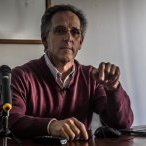English · Español

10 de mayo de 2017 | Entrevistas | Anti-neoliberalismo | Derechos humanos | Justicia climática y energía
Proposals to discuss another energy model
Descargar: MP3 (5.4 MB)
On May 4-5, the working group on Environment of the Trade Union Confederation of the Americas (TUCA) held in Uruguay a workshop on “Energy transition, climate change and sustainable development”. There, Real World Radio interviewed Argentinian teacher and engineer Pablo Bertinat, who launched the report: “Just energy transition. Thoughts on the democratization of energy”.
Members of unions from Argentina, Brazil, Dominican Republic, Costa Rica and Peru participated in the workshop. There were also representatives of the Friedrich Ebert foundation, which supported the workshop and of REDES – Friends of the Earth (Uruguay) as a strategic ally.
Pablo Bertinat is an electric engineer and professor at the National Technological University of Rosario, Argentina. He´s been working for over 20 years around energy issues with unions and social organizations. The document he presented at the workshop was produced in December 2016. Based on an analysis of the energy matrix, he proposes ways to move forward to systems that are more just and insists on the need to democratize the approach to these issues.
In an interview with Real World Radio, Bertinat explained that the exponential growth of energy use is "unsustainable" and that while there is an increasing awareness about the importance to stop using fossil fuels, it is necessary to "find ways to meet human needs with less energy use". But he also made reference to the issue of inequality: "Energy use by 18 % of the global population who live in OECD countries (Organization for Economic Cooperation and Development, which gathers developed countries and guests) is four times higher than the 82% of the global population who live in the rest of the countries", states the document.
In order to reverse energy problems, Bertinat proposes the implementation of the "five Ds: deffosilize, decommodify, democratize, deconcentrate and decentralize". He stated that "the energy issue is much more complex than greenhouse gas emissions. It is a strongly commercial system, with a scarce sense of law, with access inequality, people displacement, destruction of territories. It is not only about defossilizing, but about decommodifying and democratizing”. About this, he said that "in the area of energy there is little citizen participation when deciding about the direction of energy policies. It is an area that traditionally lacks citizen participation, not only when it comes to deciding if someone is displaced from a territory or not, but when deciding the general lines of energy policies". That is why he insisted, in his dialogue with union representatives, on the need to "inform, build capacities and generate spaces that allow for decision making on energy issues not to be left in a few hands", he said.
There is a sixth D, according to Bertinat: deprivatization. He said that the energy sector "should be in public hands", among other things, to "weaken a capitalist logic at energy level". This is why he proposes to strengthen the public sector "trying not to restrict it to the public-state sphere". But ownership is not a guarantee. Bertinat regretted that many public companies handle themselves with the logic of private companies and have brought damages to communities, as is the case with several oil companies in Latin America.
"In order to discuss energy in its entire dimension, we need to discuss the development model, and therefore we need to discuss the production model: what is produced, what is not produced, what for, for whom", said Bertinat. This is why, "in the near future there are sectors that should disappear", such as the gun, nuclear or hydrocarbon industries, but for this he proposed "to think on a transition". "What is key is to ensure dignified living conditions that allow to meet human needs, without destroying other human beings or nature", he stated.
Bertinat considered that there have been advances in the past years. For instance, he made reference to the fact that 20 years ago, to talk about defossilizing the energy matrix seemed "completely insane". He insisted on the collective process and the benefits of working together with union and social movements, where it is possible to see up close the situation of people affected by dams and oil industries. "We´ve changed and advanced. It is a spiral process, filled with complications", he said, but he added "there are spaces to build new agreements". In this way, he said that the Continental Day for Democracy and against Neoliberalism, to be held in Montevideo, November 16-18, will be "a good moment to discuss how to strengthen democracy and how we face neoliberalism around these issues".
Imagen: www.redes.org.uy








